Nature-oriented early childhood education and care
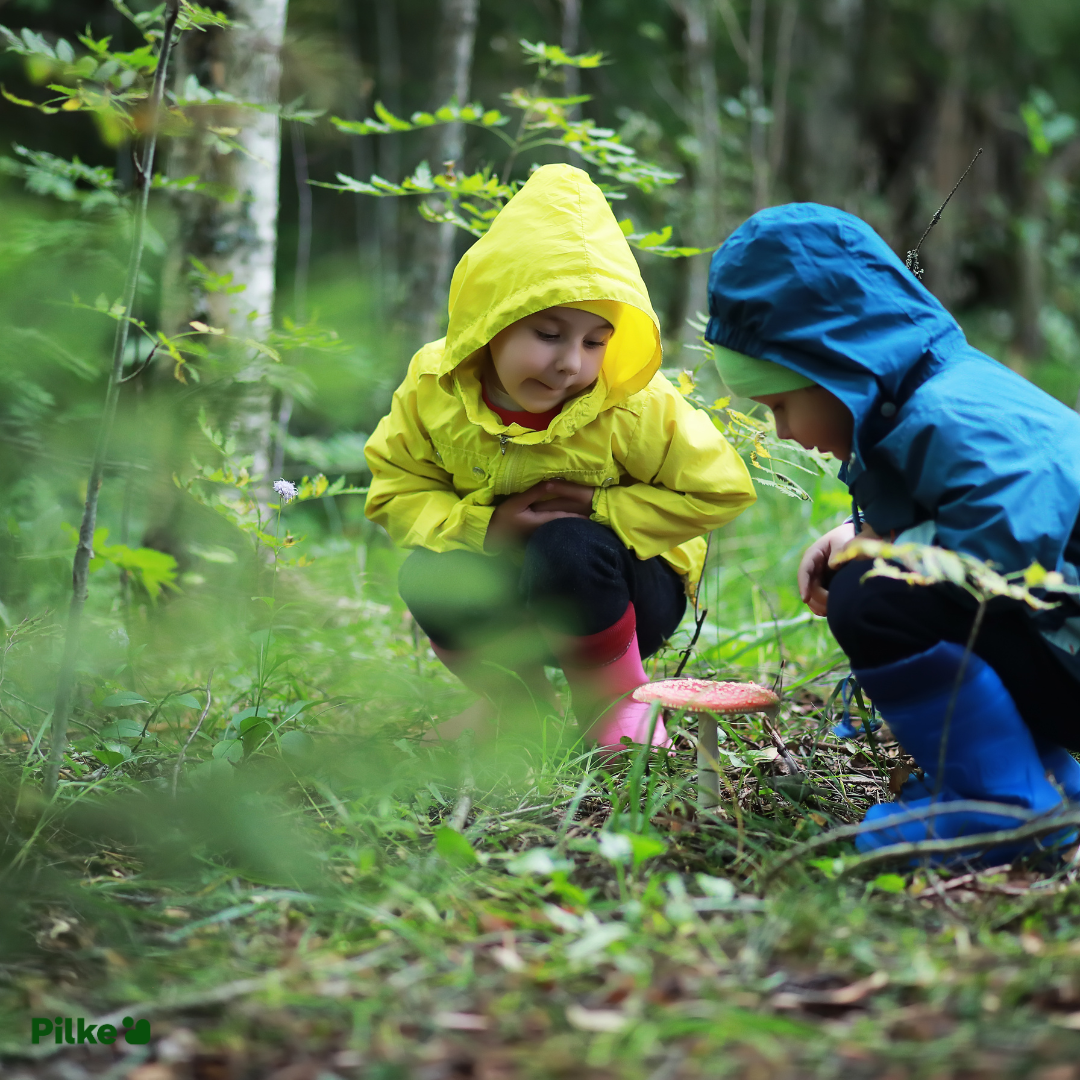
Nature-oriented early childhood education and care, i.e., activities at nature daycare centres focus on examining and investigating nature, regular excursions, and spending time outdoors. The forest is a wonderful place for children to play, and it provides endless ideas and ways for play, exercise, and creativity. At nature daycare centres, children regularly spend time outdoors and go on excursions whatever the weather.
All activities at the daycare centre are steered by play, working together, and listening to children’s thoughts. The things that children experience and observe in their daily lives are the basis of learning. That’s why inventiveness, recycling, and using things found and seen in nature to learn, play, and create a learning environment are an important part of daily life at the daycare centre.
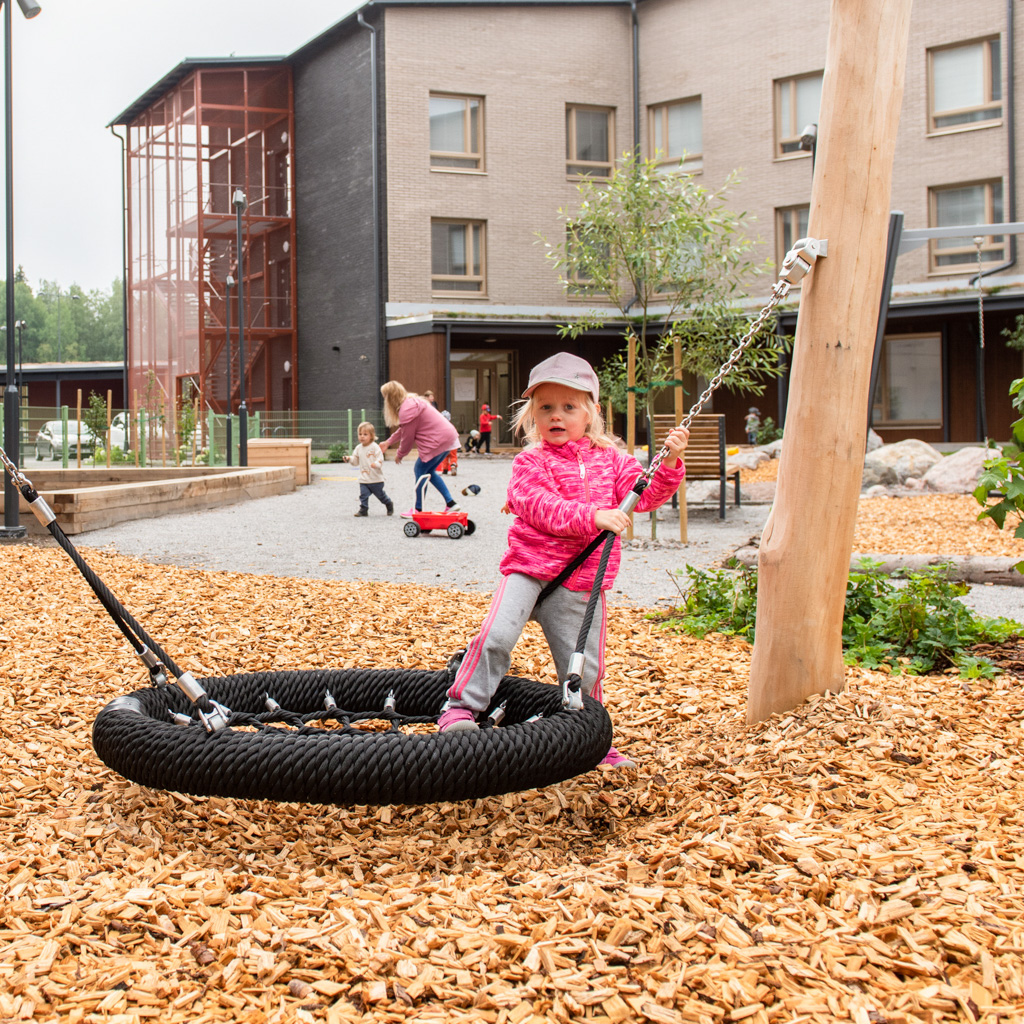
Among Pilke’s nature daycare centres, there are also six daycare centres in the “At Home in Nature” network, where spending time outdoors forms the basis for all their activities. Sometimes even afternoon naps at these daycare centres are taken outside, such as in a lean-to or hammocks.
“At Home in Nature” (Luonnossa kotonaan) is an activity format that has been coordinated by Suomen Latu since 1999. It focuses on exercising in nature and in natural and environmental education in early childhood education and care and in afternoon activities for schoolchildren. At Home in Nature means spending time outdoors whatever the weather, all year round.
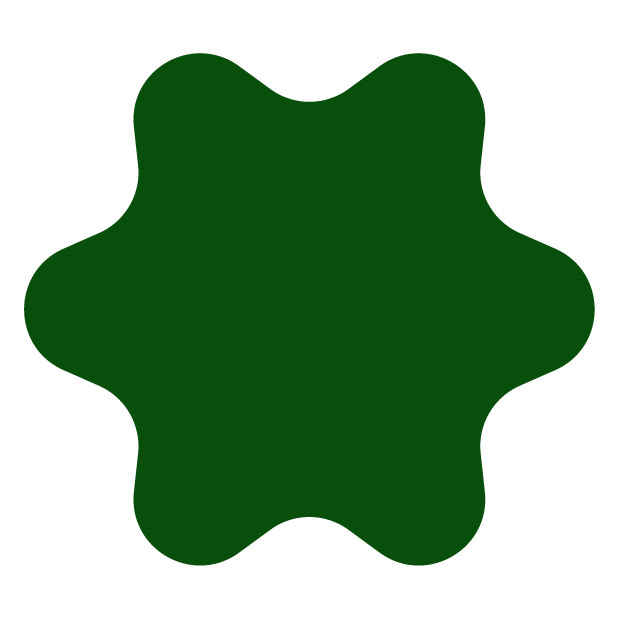
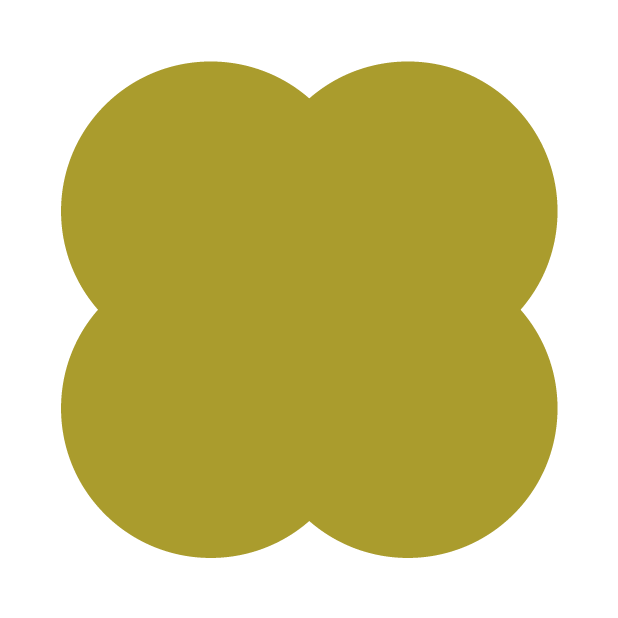
How is the focus on nature seen at the daycare centres?
“Primarily, a nature daycare centre is a regular daycare centre – but nature and environmental education play a major role in the implementation of the early childhood education and care curriculum,” explains Hanna Viilomaa, who is responsible for nature activities in ECEC at Pilke daycare centres.
The focus on nature means that nature is incorporated into all everyday activities and games. Nature is also a learning environment, as it is as good a place as any to learn.
“Of course, parents choose a daycare centre from their own perspective. Early childhood education and care with a particular focus or orientation could simply be a bonus at your nearest daycare centre. But many parents make a conscious decision because they want to encourage and support their child’s growth and development with a certain focus, such as nature.”
When choosing a daycare centre, many families consider and compare programmes; what everyday life at the daycare centre is like, and what activities there are.
“We get lots of positive feedback from families at nature daycare centres. The parents are happy that their children spend lots of time outdoors. We go on trips and spend time in and around nature, and the children are interested in how Earth is doing.”
Children’s motor skills and mobility improve in a completely different way outdoors and in nature than indoors. And exercise and outdoor recommendations are easily and widely met at the same time. It’s often easier to concentrate in nature, and children feel freer than they do indoors.
“The children often don’t mind whether they spend time in a forest or a park. It is already exciting enough that they’re heading past of the gates of the daycare centre. The children enjoy the activity of forest trips because they aren’t just sitting indoors. And the changing weather and seasons are part of the experience, too.”
As children spend a lot of time outdoors at nature daycare centres, parents are often concerned about how to dress their child appropriately. What clothing should the child wear, and will they be okay outside in winter? “Clothing is of course and important part of spending time outdoors. In winter we spend less time outdoors, but in the summer, we might be outside every day. The adults at the daycare centre discuss this a lot with parents and can provide tips on the clothing and equipment the children will need.”
The daycare centre and staff are always bound by the same requirements, regardless of orientation or focus. Staff who are interested in nature and outdoor life apply to nature daycare centres.
“The staff at our nature daycare centres really enjoy the addition and freedom of the orientation. Nature forms a kind of backbone to planning.”
An example of a weekly programme at a nature daycare centre
Every daycare centre has its own programme, and more detailed information is available from the daycare centre manager. Please feel free to read and learn more about your nearest Pilke nature daycare centre!
On Monday, we spend as much time as possible outside
No toys are allowed outside, and we instead encourage the children to find things to play with in the yard to help their imagination to develop, or to play shared games, such as tag, hide-and-seek, football, the colour game, and skipping.
Guided lessons outside can include e.g. crafting with natural materials, playing music using materials found in nature, or even preschool in the daycare centre’s yard.
Tuesday’s theme is investigating nature
Nature-watching includes things like bird spotting in the yard, following the course of spring or winter, investigating the daycare centre yard, looking for bugs, and watching and monitoring the weather. Or we investigate and do experiments, look for information in books or online, and learn different plants and animals through games.
Wednesday is recycling day.
We think about our daycare centre’s targets for recycling and sustainable living in e.g. the children’s recycling meeting. Sometimes we go on a trip to a recycling point, litter pick in nature, or follow a decomposition project over the course of a year.
On Thursdays, we learn about urban agriculture and taking care of plants.
We sow flower or plant seeds in e.g. milk cartons and later plant them outside in a planter. In the following weeks, we can watch the plants, care for them, and think about what they need to grow.
Friday is forest day.
We either go on a trip to the forest or spend the entire day in the forest playing and being active. We also eat lunch or a snack in the forest, and create a shelter to rest in.
We experiment, learn, and do things in our environment
How is the focus on nature seen and implemented from the perspective of early childhood education and care? And what does a focus on nature, environmental education, and sustainable development mean in everyday life and planning at the daycare centre?
Pilke’s nature managers have made this guide on nature-oriented early childhood education and care at Pilke daycare centres. Read our guide
- to a nature-oriented vision
- to a nature-oriented theoretical and pedagogical framework
- to various methods of implementing a focus on nature
- to instructions and things to consider when planning trips
- to tips and examples for different seasons.
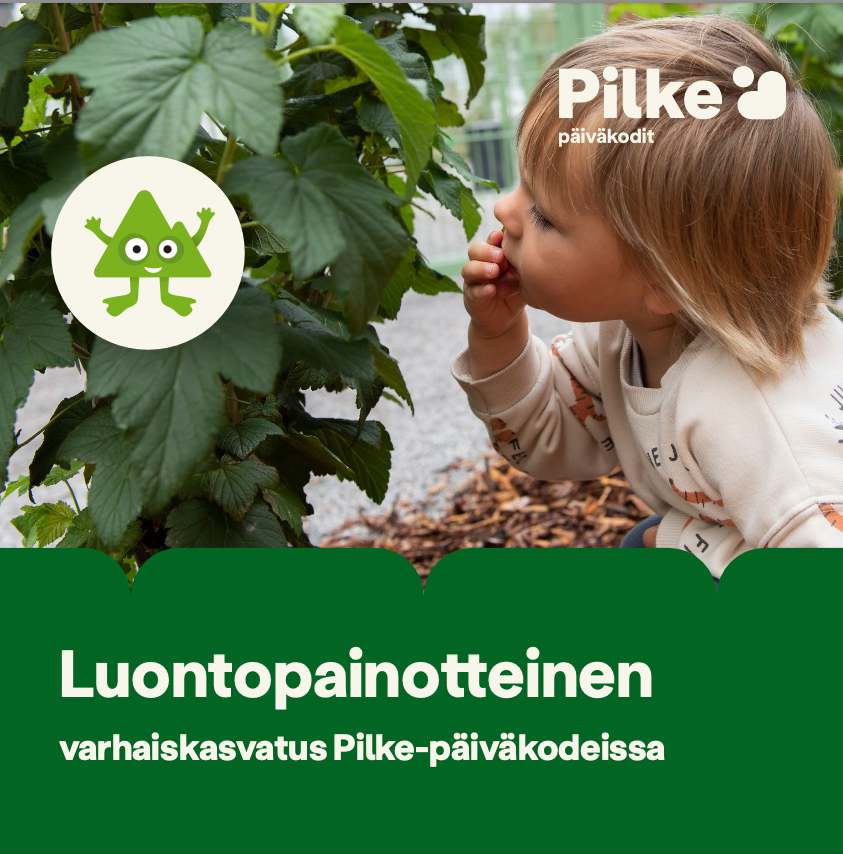
One important goal of environmental education is to strengthen the child’s relationship with nature.
Daily life for children at the Pilke daycare centres Sotkankoto and Uikunkoto aligns with the At Home in Nature activities, where outdoor life with yard games and forest trips are an important part of everyday activities.
Children learn a sustainable lifestyle at nature daycare centres
At Pilke daycare centres, we operate in accordance with the principles of sustainable development every day. The basis of sustainable development is for children to form a personal relationship with nature. When children learn to enjoy nature, they gain an appreciation for their surroundings.
“Our everyday life with the children is unhurried time spent outdoors, learning in nature. A nature daycare centre provides an excellent framework for child-led early childhood education and care,” explains Elina Salmela, manager at Pilke’s Taikaniitty daycare centre in Ylivieska.
Environmental education and everyday actions
In a world where children can learn and grow, sustainable development and shared responsibility for our environment play a key role.
Our most effective method of changing the world is to educate children about a sustainable lifestyle and encourage them to follow it. At Pilke daycare centres, we practice everyday methods for sustainable development using methods that are appropriate for children. Sustainable development aims at providing good opportunities for the current and future generations. It considers the environment, economy, and human wellbeing.
For example, environmental education is an important part of early childhood education and care. Responsibility for the environment is implemented at daycare centres together with the children in different ways every day. We use lots of natural materials and consider reuse in our activities. We utilise the daycare centre’s nearby natural environment for excursions to help us respect and learn about nature.
We discuss things like food waste, rubbish sorting, recycling, and ways of conserving nature with the children.

10 ways that we incorporate sustainable development at our daycare centres
- We turn off the lights when we leave the room, and we do not leave water running.
- We minimise food waste and only take as much food as we can eat.
- We reduce the amount of plastic waste and do not use plastic disposable utensils or overshoes, etc.
- Our procurements are sustainable and we utilise recycled and natural materials in crafting.
- We let plants and animals live in peace. We investigate them, but we do not harm them.
- We do not litter on our nature trips: we do not use juice boxes with straws, and we always pick up litter.
- We recycle everything we can: biowaste, cardboard, glass, metals, paper, and batteries.
- We utilise libraries, second-hand stores, and other local services.
- We support and practice emotional and friendship skills daily.
- We remember to say please and thank you, you’re welcome, sorry, good morning, and bye-bye!